Dental Implants – Waco, TX
Rebuild Your Smile with Lifelike, Long-Lasting New Teeth

Do you have missing teeth? Do they make it difficult for you to speak clearly or impossible to eat all of your favorite foods? Do they make you shy away from meeting people or cause you to avoid social functions altogether? If so, each of these problems and more can be completely taken care of with dental implants. They are the most permanent and aesthetically pleasing tooth replacement option currently available today, and you can get them right here at Premier Family Dental with Dr. Rick Cofer’s or Dr. McNutt’s help. Call us today to schedule a consultation for dental implants in Waco.

Why Choose Premier Family Dental for Dental Implants?
- Dental Implants Placed & Restored In-House
- Dentist Is a Fellow of the International Congress of Oral Implantologists
- State-of-the-Art CT / Cone Beam Scanner for Precise Implant Placement
What Are Dental Implants?
Dental implants are relatively simple in structure, consisting of three basic parts: a titanium root, an abutment, and a custom restoration. This titanium root is what makes dental implants so special – they replace the entire tooth structure, unlike dentures and bridges, which only replace the visible part of the tooth. The abutment is a small, screw-like device that attaches the restoration to the titanium root. Your restoration can be a dental crown, bridge, or even a full denture. Dental implants are so versatile that they can be used to replace a single tooth, multiple teeth, or even an entire mouthful of teeth.
The 4-Step Dental Implant Process

Dental implants in Waco can benefit patients in a variety of different tooth loss situations. Whether you’re missing a single tooth or all of your teeth, this restorative process allows you to enjoy the beautiful aesthetic benefits of traditional restorations without having to miss out on the structural importance of the roots of your teeth. With so many unique benefits to offer, our patients will agree that this procedure is well worth the financial and time investment.
THE INITIAL CONSULTATION

Every patient will undergo an initial consultation with their implant dentist in Waco, Dr. Cofer or Dr. McNutt. During this visit, our team will speak with you about the goals you’d like to meet once your treatment is complete and discuss your medical and oral health history. Your dentist will then conduct a thorough visual examination of your mouth and capture any X-rays to gain a better understanding of your unique tooth loss situation. With the information we gather, we’ll create a customized treatment timeline, so you know exactly what to expect throughout the process.
DENTAL IMPLANT SURGERY

This is a minor surgical procedure where we make a small incision in your gums and position the implant posts so they can provide maximum hold and stability. We’ll use a variety of scans and X-rays to make sure the implants are secured in the perfect places.
OSSEOINTEGRATION & ABUTMENT PLACEMENT

After your dental implant surgery, you’ll be given four to six months for your gums to heal and your dental implants to fuse with your jawbone through a process called osseointegration. Any pain or soreness from the procedure usually lasts about a week, and it should be easily managed with over-the-counter medication. This period is mostly to allow time for the posts to naturally bond to your jawbone to provide your future restorations with a strong and stable foundation to be attached to. This is another reason why dental implants are so reliable and durable –the posts connect to your jaw just like your natural teeth.
You’ll return to Premier Family Dental when you’re fully healed so that your dentist can place your abutments, which is what will connect your restoration directly to the implants. During this time, you’ll have a temporary restoration so you can smile with confidence as your gums heal around the abutments.
ATTACHING THE FINAL RESTORATION

As soon as we receive your final restoration at our dental office, we’ll call you back in for your last appointment. After removing the temporary restoration, we’ll attach your permanent one and allow you to look in the mirror and make sure it lives up to your goals and standards.
Benefits of Dental Implants

There’s no substitution quite like your natural teeth, but fortunately, there is a treatment that comes incredibly close to the real deal. Dental implants combine the lifelike appearance of traditional dental bridges and dentures with the stability that comes with restoring the missing root structure of teeth. Boasting impressive success rates and a beautiful, natural appearance, it’s no wonder why so many patients choose to restore their smile with this advanced solution.
DAY-TO-DAY BENEFITS

Not every traditional restoration offers the security required to comfortably chew your food. In fact, many people who have been wearing their dentures for quite a while experience slipping and shifting when they eat because their prosthetics no longer perfectly fit their mouth due to palate changes. With dental implants, you can chew all of your favorite foods without having to worry about embarrassing moments.
A boost of confidence may not seem like a life-changing benefit, but you’d be surprised! When you have a complete and natural-looking smile that’s restored with dental implants, you’ll see improvements in many different areas of your life, such as social interactions, career advancements, and even dating.
Unlike most tooth replacement treatments, dental implants are incredibly easy to care for. In fact, you take care of them just like you would your natural teeth. By brushing twice each day, rinsing daily, and visiting your dentist every six months for a dental checkup and teeth cleaning, you can enjoy your new smile for decades to come.
HEALTH BENEFITS

Your natural teeth have roots that are anchored to your jawbone, providing it with stimulation and blood flow that keeps it from deteriorating. When those teeth go missing, or even if they’re replaced with prosthetics like dentures that only restore the biting surface, you’ll begin to notice facial changes over time as a direct result of deterioration. Because dental implants restore the roots of your teeth as well as the biting surface, you won’t have to worry about this issue.
Gaps in your smile aren’t just an aesthetic issue. They can also put you at an increased risk of other problems, such as gum disease. With a complete smile, you won’t have to worry about hidden nooks and crannies collecting plaque, bacteria, and tartar that could put your oral health in harm’s way.
Eating all of your favorite foods isn’t just a day-to-day benefit. It also expands your diet so you can get the nutrition your body needs to thrive. By easily being able to eat steak, chicken, breads, and other integral foods in any diet, you’ll be able to stay healthier.
LONG-TERM BENEFITS

Dental implants offer an impressive 95 percent success rate, even 10 years after they’re placed. Not only can you rest assured that your choice to invest in dental implants in Waco will be worthwhile, but you can also be confident that the procedure is tried-and-true.
Some patients can be deterred from getting dental implants because they have a higher price tag than traditional dentures. However, something to consider is that their lifespan is about four times as long (35+ years). That means that you won’t have to visit your dentist in Waco as often to replace or repair your restoration, saving you money and time.
Another long-term benefit of dental implants is that you won’t have to alter your lifestyle. If your friends invite you out to a steakhouse or you run marathons, you won’t have to worry about whether your prosthetic will be able to handle the movement or chewiness, because dental implants are the most stable tooth replacement option available.
Who Dental Implants Can Help

Most adults with healthy mouths are potential candidates for dental implants; we can confirm your candidacy during your first appointment and let you know whether any preparatory procedures need to be completed first. Remember, no matter how many teeth you’ve lost, dental implants can be a viable option for filling in all the space. Here’s an outline of what the dental implant process will look like based on the number of teeth that need to be replaced.
Missing One Tooth
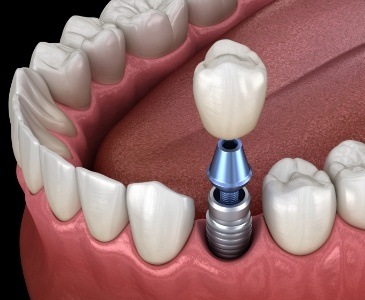
An all-porcelain dental crown attached to a dental implant will be used to replace a single tooth. Dental porcelain is just as strong and durable as natural enamel, and it can be specially shaded to seamlessly match the rest of your smile.
Missing Multiple Teeth
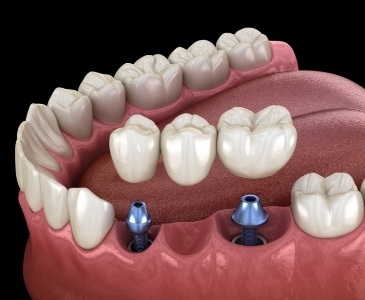
Dental implants can also be used to support a dental bridge. Once an all-porcelain crown has been placed, it can be bonded to multiple prosthetic teeth that will simply sit on top of the gums. This is much faster than replacing each tooth with individual dental implants, and it doesn’t require your other teeth to be filed down to hold crowns, which is required for traditional bridges.
Missing All of Your Teeth
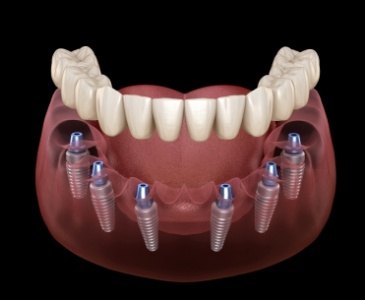
Dental implants can also support a set of full dentures for the upper and/or lower jaw. Implant dentures have many benefits over traditional ones:
- Since they are held in place with dental implants, they will never slip, pop, or click.
- They retain their fit for much longer because they support the jaw and keep it healthy and full.
- They provide a much stronger bite force than traditional dentures, which means patients can enjoy a wider variety of healthy foods. Many patients can’t chew essential proteins and vegetables with normal dentures, and they often become malnourished. This is why people with traditional full dentures tend to live 10 years LESS than the average life expectancy. Thankfully, implant dentures can correct all of these problems and last an entire lifetime.
Understanding the Cost of Dental Implants

The cost of dental implants in Waco is influenced by many factors, including how many teeth you need to replace. While traditional dentures and bridges may cost less initially, no other restorative treatment can compare to the maximum stability and long-lasting nature of dental implants. During an initial consultation at Premier Family Dental, your dentist will carefully examine your smile, discuss your unique goals, and provide you with an accurate cost estimate. Dental insurance, financing, and/or our in-house membership plan may help make your new smile as affordable as possible.
PRELIMINARY TREATMENTS & DENTAL IMPLANT SURGERY
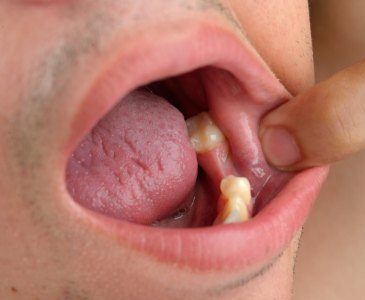
To prepare for dental implant surgery, you may first have to undergo some preliminary treatments. When necessary, gum disease treatment, tooth extractions, or bone grafting are critical to ensuring successful implant treatment. However, these procedures will likely add to your overall costs.
The dental implant placement surgery, which often involves anesthesia, also incurs its own cost. Many dental practices must send their patients to an outside specialist for this step, which can be a hassle and sometimes increase costs. Fortunately, your experienced implant dentist in Waco can place implants right here in our dental office.
THE PARTS OF YOUR DENTAL IMPLANT
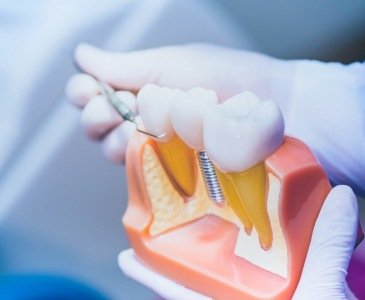
The material used to craft your dental implants, the number of teeth you need to have replaced, and the type of restoration you receive will all affect the cost of your dental implants in Waco. Most dental implants are made from either titanium or zirconia. However, just like some brands of cars are more reliable and long-lasting than others, some dental implant brands and materials offer certain advantages. We will be happy to share more details about the implants we use to replace teeth during your initial consultation.
HOW DENTAL IMPLANTS CAN SAVE YOU MONEY

Although dental implants present a significant upfront cost, they may actually save you money in the long term. That’s because they have the potential to last a lifetime. If you calculate their cost per day over a few decades, they are usually less than a daily cup of gourmet coffee! They are a better value than treatments that cost less upfront but that require frequent replacement, such as dentures. Plus, the many oral health benefits that dental implants offer can spare you from paying for restorative treatments down the road.
DOES MY DENTAL INSURANCE COVER DENTAL IMPLANTS?

Although many dental insurance plans do not cover dental implants, there are some exceptions. Preliminary treatments like gum disease therapy or a bone graft procedure are typically covered by insurance. In addition, you may be able to count on your policy to reduce the cost of the crown, bridge, or denture that we attach to your implants. If you would like assistance to navigate your insurance, our expert staff at Premier Family Dental will be happy to help you understand and maximize your benefits.
MAKING DENTAL IMPLANTS AFFORDABLE

Even without dental insurance, you can still restore your smile with dental implants without blowing up your budget. For instance, patients that sign up for our in-house membership plan receive preventive oral care for a predictable flat rate and sizable discounts on other procedures like implant treatment. We are also proud to partner with CareCredit and Compassionate Finance. These trusted dental financing organizations offer low to no-interest payment plans for implant treatment and other dental services.
Dental Implant Failure & Salvage

Although dental implants are one of the most comprehensive and effective ways to rebuild missing teeth, there can always be a small chance that they fail. Whether you notice that your new tooth is starting to feel loose or painful, you’ll want to visit our team for dental implant salvage treatment. We’ll be able to evaluate the underlying cause of the complication so that we can develop a proper plan for rescuing your titanium post.
Learn More About Dental Implant Failure & Salvage
Dental Implant Post-Op Instructions
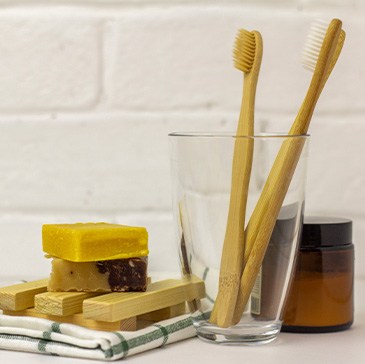
After your dental implant placement surgery, there is a recovery period. We will give you detailed post-op instructions to abide by so you can heal quickly and comfortably. If you have any questions or concerns, don’t hesitate to contact us. Everyone’s treatment looks slightly different, but here is what you can expect after surgery.
What to Do Directly After Dental Implant Surgery

The top priority during the healing process is to leave the blood clot at the surgical site untouched. This is necessary for the process to go as smoothly as possible. Here are some rules that you will need to follow to achieve this:
- Don’t spit – use a tissue or swallow your saliva
- Don’t use a straw when drinking
- Don’t smoke after surgery
- Keep your tongue and fingers away from the surgical site.
Common Side Effects When Recovering from Dental Implant Placement

You will likely experience some minor side effects for a few days following your procedure. Here are the most common ones:
- Bleeding: Minor bleeding is common for a few days after surgery. To reduce bleeding, use gauze and light pressure.
- Swelling: For the first 72 hours after your procedure, inflammation is likely. Use a cold compress to reduce this.
- Discomfort: Soreness is normal after dental implant surgery. This can be managed with over-the-counter and prescribed pain relievers.
Your Diet After Dental Implant Surgery

After surgery, it is ideal to stick to softer foods to avoid aggravating the surgical site. Here are some food suggestions:
- Scrambled eggs
- Oatmeal
- Soup
- Mashed potatoes
- Yogurt
- Apple sauce
- Pasta
- Pudding
- Ice cream
Post-Op Health & Oral Hygiene
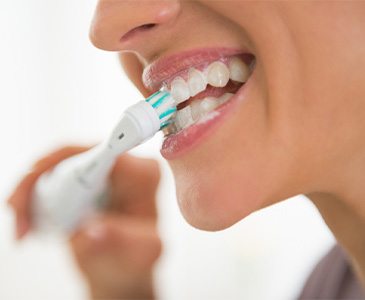
The day after your surgery, brush your teeth as you normally would. Just be careful to avoid the surgical site. To keep this area clean, gently rinse your mouth with salt water two to three times a day after your meals. When you use mouthwash, be sure to pick one that doesn’t contain alcohol. This can aggravate the surgical site.
What to Do After Your New Teeth Are Attached

Now that your replacement teeth have been attached to your implants, the difficult part is over. You might notice some minor sensitivity as your mouth adjusts, but this should be easy to manage and temporary. You shouldn’t experience any bleeding, swelling, or extensive recovery.
Maintaining & Caring for Your Dental Implants

Dental implants are built to last, to the point where they still have a 95% success rate after 10 years. But just like your real teeth, their longevity depends on your ability to take care of them and protect them from damage. Dr. Cofer and Dr. McNutt can provide you with some helpful tips for implant maintenance once surgery and placement are complete. As long as you’re diligent with your implant care, they’ll continue to serve you well while you eat, speak, and enjoy yourself with your loved ones.
MAKE ORAL HYGIENE A PRIORITY
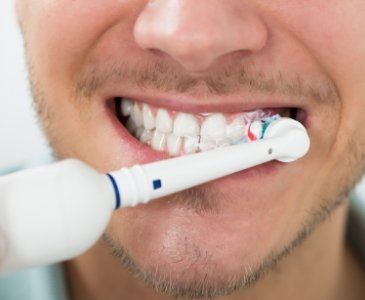
Dental implant restorations have to be brushed and flossed like real teeth. While cavities are not a concern for dental implants, you need to keep them clean of bacteria that could attack the nearby gum tissue and eventually cause bone and tooth loss. (There’s also a risk that any bacteria on the implants could also cause tooth decay on nearby teeth.) Make sure that you’re brushing for at least two minutes every day. Rinsing with an ADA-approved mouthwash also helps.
EAT A HEALTHY DIET

An occasional sugary snack shouldn’t be too much of an issue, but eating nothing but sugar and starch can lead to serious dental issues – particularly the kind that can put your implants at risk. Make sure your diet contains plenty of fruits, vegetables, lean proteins, and dairy products that won’t have a negative impact on gum and tooth health. Foods rich in calcium and vitamin C are particularly good for your mouth and will help you maintain a jawbone that can safely support your dental implants for decades.
BREAK BAD HABITS

Have you been smoking or using tobacco products for a long time? Do you occasionally bite your nails or chew on pen tips when you’re feeling nervous? Do you use your teeth instead of scissors to open packages? All of these habits tend to be very hard on the teeth; in fact, some of them may have even contributed to your tooth loss in the first place. You can keep your implants safe by breaking these habits as soon as possible. Keep sugar-free gum handy for when you want to chew on something. You can also research programs and other resources that can help you stop smoking.
PROTECT YOUR DENTAL IMPLANTS

When you’re under a lot of stress, you might start grinding your teeth without realizing it. This is especially a problem while you’re sleeping and don’t have direct control over what your mouth is doing. Investing in a mouthguard to wear at night could keep your implant (and the rest of your teeth) from suffering serious damage. Of course, you should also get a mouthguard if you plan on playing any sports; the last thing you want is to break your implant after getting hit in the jaw.
SCHEDULE REGULAR DENTAL CHECKUPS
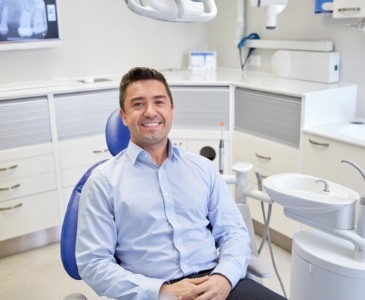
We can detect potential problems with your dental implant that you may not notice by yourself. Continue visiting our office for regular dental checkups so that any issues can be dealt with quickly and at a reasonable cost.
Dental Implant FAQs
Are your missing teeth making it hard for you to enjoy everyday activities like smiling, talking, and eating? If so, chances are you could benefit from dental implants. Before you begin the procedure, we’ll be sure to answer any questions you may have. In the meantime, we invite you to read through this list of the answers to some frequently asked questions about dental implants.
Why are dental implants better than traditional bridges?
Without the teeth roots to support them, the jaw and gums tend to weaken and recede. While a traditional bridge might look great, it does very little to stop this process, and it often can’t prevent additional tooth loss as well! Dental implants have all of the aesthetic benefits of traditional restorations with the added advantage of being a clinical solution because they restore this essential support. When it comes to health, looks, and durability, dental implants are by far the best way to replace missing teeth.
How long does it take to get dental implants?
This can vary greatly from person to person. Many people can complete the entire dental implant process in less than 6 months, while more complicated cases can often take over a year. We will be able to map out your particular treatment plan at your first appointment so you can get a better idea of your particular timeline.
How long does a dental implant last?
Dental implants can easily last for 30 years or more with the proper maintenance. They just need to be taken care of like your natural teeth. With daily brushing, flossing, and regular dental checkups and teeth cleanings at Premier Family Dental, your dental implants should look and feel like new for many years to come.
How does the cost of dental implants compare to other options?
Dental implants might seem to be more expensive than other restorative procedures, but they are extremely cost-effective over the long term. Traditional bridges and dentures typically have to be replaced every 5 to 10 years, while dental implants can easily last over 30. This means that for many, dental implants are a one-time cost with decades of consistent benefits. Also, many insurance plans provide excellent coverage for dental implants, and we also accept payment plans through CareCredit and Compassionate Finance if you need low-to-no-interest financing. All in all, when it comes to cost versus outcome, dental implants are one of the best deals in not just dentistry, but all of healthcare.
Will I Have to Take Off Work for Dental Implant Surgery?
Most patients only need a day or two to recover. So, if you schedule your appointment on a Friday, you may only need to take that day off. Of course, there are some exceptions. For example, if you have a physically demanding job, then we will likely recommend taking at least three days off to avoid complications, like blood being diverted from the implant site. Ultimately, this is something that you and your Waco dentist will need to discuss and decide together.
What Can Cause Dental Implants to Fail?
Dr. Cofer and Dr. McNutt do everything they can to ensure success. That said, there are several variables that play a role in the longevity of dental implants. Osteoporosis, certain autoimmune disorders, diabetes, and poor habits, like smoking, have all been linked to dental implant failure. The two most common reasons, however, are peri-implantitis and failed osseointegration. At your initial consultation (and throughout the process of rebuilding your smile) we will give you specific instructions on what you can do to reduce your chances of both, including committing to a solid oral hygiene regimen at home.
Am I Too Old to Get Dental Implants?
Candidacy for this state-of-the-art tooth-replacement option is determined by things like jawbone density and commitment to good oral hygiene, not age. So, whether you’re in your 30s or in your 80s, don’t hesitate to schedule an appointment – there isn’t an upper age limit! Once you come in, we can conduct a comprehensive oral exam, learn about your medical and dental history, and determine if dental implants are ideal for you.
Can I Get Dental Implants If I Smoke?
Since smoking increases the risk of complications, like dry sockets, it’s something we need to seriously consider. At the very minimum, you will need to refrain from using tobacco products during the two weeks leading up to your procedure and for two months afterward. Many patients use this as an opportunity to break the habit altogether. If that’s proven to be difficult in the past, then let us know – we can help!
Will People Be Able to Tell That I Have Dental Implants?
Decades ago, replacement teeth were known for being bulky and obvious. That’s not the case today. Not only are dental implants crafted from lifelike, durable, and high-quality dental materials, but the size, shape, and shade of each restoration is custom-made to ensure it blends in beautifully with your smile or restores the smile you’ve been missing seamlessly. Dental implants are also inserted directly into your jawbone (instead of resting against your gums like other tooth-replacement options), which ensures they don’t move when you talk, laugh, and chew.
Will I Have No Teeth After Implant Surgery?
This is a common question among patients who are having an entire arch of teeth (or all of their teeth) replaced with dental implants. If you’ve been curious about this, you’ll be happy to know that we can use a “healing denture” so you have a complete smile while your dental implants fuse with your jawbone. This is something that we will need to discuss during the initial consultation, and we will review the process and cost at this time as well.
